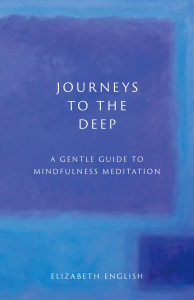
~ Written by Elizabeth English ~
Elizabeth was an early participant on the Teacher Training Pathway (TTP), starting 2014, mentored by Eluned Gold and supervised by Pam Erdmann, certified in 2019. During her TTP journey, Elizabeth delivered over 50 eight-week courses (plus a good number of workshops) to well over 1500 students due to the nature of her role as Cambridge University’s first ever Mindfulness Practitioner. Elizabeth refers to this time as a ‘steep and effective learning curve’. Her courses at Cambridge University were the basis for the largest-to-date research trial into Mindfulness for Students, the result of which were published in The Lancet, Dec 2017. With Eluned’s support, Elizabeth adapted the Oxford course, ‘Finding Peace in a Frantic World’ created under Prof. Mark Williams, to create the 8-week course now delivered at Cambridge University, ‘Mindfulness Skills for Students’. Elizabeth is a Mindfulness Teacher and published author.
My father had an embarrassing habit. He would unexpectedly break into poetry at odd moments, and, more embarrassing still – his own poetry. Imagine my concern when I found myself following in his footsteps. And in a mindfulness class, too…
Of course, my mindfulness training has been full of verse: wonderfully inspiring poems read out before or after a meditation, able to evoke a mood, or express my hopes and dreams. But these have been other people’s words. To offer my own words has come as a bashful surprise. I would never have dreamed of publishing, except that my poems illustrate something I want to express – ideas about meditation. Just as a journal may be more of a mirror than a memoir, writing poems helps me to learn –and this is what I share in my book: Journeys to the Deep: A Gentle Guide to Mindfulness Meditation (Mud Pie, March 2022).
At the start of my mindful journey, the idea of journalling did not inspire me. I was reluctant. I spend all day with a screen, and using a notebook is hampered by my lack of handwriting (‘like a spider on an owega boad’, in a school report); and now, with an aching hand and the fuss of reading glasses – it’s all too much bother when I would rather spend those precious moments, well, meditating.
Journalling made more sense to me when I heard it described by Jason Siff, teacher of Recollective Awareness. Jason points out that ‘recollection’ is a fair direct translation of ‘mindfulness’ (from the Sanskrit root, √smṛ ‘to remember’). Recollecting what has happened within a meditation is a way to shed light – a clearer light, perhaps – on what went on within it. I liked this. I could see how reflecting could help me learn. I was still unsure about journalling long-hand, but surely I could reflect just as well with poetry? And poetry suits meditation, dealing as it does in metaphor, as a gateway to experience that goes beyond words. And so I developed, “the mindful habit of pondering after a meditation…”
And as I ponder, I write. Sitting on, pencil in hand, I scribble and dabble. I muse in a lazy, sidelong fashion. More often than not, I choose poetry, that pithy pathway to the deep. Following its unique logic, I have some hope of surveying the muddled and murky mind-ways through which I paddle, plunge, surf and stew as I journey within. So the poems spring directly from the source. Composed immediately after (sometimes within) my meditation, each one has helped me explore an inner landscape and discover some meaning – however momentary, dim or dusty. (page XIII)
It’s also true that writing a poem can itself lead us towards meditation. In the Foreword, Rt Rev Rowan Williams, an Archbishop-poet, captures a moment of pure mindfulness:
“Poems are meant to slow us down… It takes a moment, or a connection between perceptions or sounds, or a single odd and arresting picture and says, in effect, ‘Take your time with this; let it be and sit with it. Don’t look for a “message” or a bright idea; just give time for your mind and heart to be opened up to find a little more space in the world.’” (page VIII)
Since my poems are meditations in miniature, they lend themselves naturally to teaching. Besides, the occupational hazard of writing a metaphor is the way it lingers. I’m liable to turn up for a class with a poem still in mind, and when a hapless student unwittingly asks a question that touches on the same theme, I can’t help myself. ‘I wrote a poem about that this morning!’ I proffer. The words are out of my mouth before I know it. ‘Oh help,’ I mutter, turning red, ‘I’m turning out just like my dad.’ But possibly more forgiving of me than I was of him, my students encourage me. They like the poems (they say); it helps them understand their own meditation. And so my Gentle Guides to Meditation came to life, including both poems and prose. If my poems could help me learn – might they also help others?
Journeys to the Deep is the first of three slim volumes, each exploring different aspects of meditation – in this case Setting Out, Curiosity and Enjoyment, and Listening Within. I hope you may enjoy the book, and perhaps find it useful in your own teaching. Who knows? Perhaps it may even inspire you to write, or draw, or sing about your own inner journeys too…
Today we learn to fly
Using the wings you have
Brought along, the ones
You made in school that time
With the fair-haired teacher who
Tried so hard, but probably
Cried in the staffroom afterwards.
And surprise, surprise, the wings
Never really worked.
So you added bits here and there
Over the years, always hoping
They might come good;
Hoping for lift off.
So these are the wings we will use
Because they are
The ones you have.
And we will start
By noticing they are there.

 Elizabeth English, 2022.
Elizabeth English, 2022.
Elizabeth’s book is available on Amazon: Journeys to the Deep: A Gentle Guide to Mindfulness Meditation





2 comments on “Journeys to the Deep: A Gentle Guide to Mindfulness Meditation”
Eluned Gold
June 1, 2022 at 6:38 pmCongratulations Elizabeth. What a gift to the world, to your students and to yourself.
Elizabeth English
June 6, 2022 at 5:04 pmHello dear Eluned – thank you for such a lovely comment on my book. I had great joy in writing it, and of course, many of the poems were drawn from my journal on the TTP! Warmly to you, and hope all is well. Locana